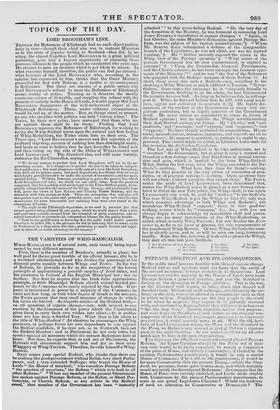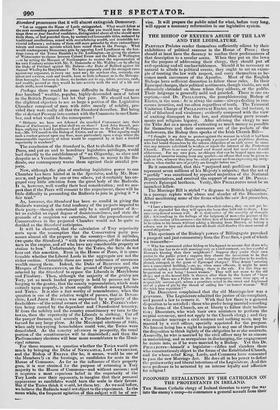PEERAGE ABOLITION AND ITS CONSEQUENCES.
IF the public mind becomes familiar with ideas of organic change
Radical writers and speakers must not fancy that the credit of the onward movement belongs exclusively to themselves. Lord
LYNDHURST and his majority in the House of Lords have made Peerage Reform a practical question, and now the Standard is forcing on the discussion of Peerage Abolition. This is the way, as the Standard well knows, to bring about that desired and dreaded event. Violent and sudden changes, revolutions by the mi- litary or the mob, cannot be effected in a community such as that in which we live. Englishince are the last peuple in the world to be taken by surprise : they require to be patiently reasoned with, and convinced by degrees, before they mill consent to lose even " the ills they have." ReSorm, therelbre, makes slow progress; . and were it not for the efforts of such writers as our eloquent con- temporary of the Standard, who compels attent ion to revolutionary propositions, it would scarcely move at all. With the aid, how- ever, of Lord LYNDHURST among the Peers and the Standard in the Press, we Radicals may succeed in giving Reform a vigorous push in the right direction. By our united exertions on all sides much may be done in the present generation.
Two days ago, the Standard considered several plans of Peerage Reform. An Upper Chamber elected by the Peers out of their own body would, as he justly remarked, be merely a Committee of the present House, and entirely Conservative ; if elected by the existing Parliamentary constituency, it would be only a second House of Commons ; if by a 20/. or 30/. constituency, it would be far more Conservative than the present House,—which the Stan- dard, we presume, deems quite unnecessary, and which certainly would not satisfy the discontented Reformers. But suppose that the House of Peers were entirely abolished, and Lords made eligible with Commoners by the present Parliamentary constituency, to seats in one grand Legislative Chamber ! Would the tendency of such an alteration be Conservative or Democratic ? The " Let us sup se the House of Lords extinguished. What would follow at will appear a necessary reformation in our legislative system. the next succeeding general election ? Why, that you would have on the hus- tings three or four hundred candidates, distinguished above all who should meet traditional recollections, armed with overwhelming wealth, and irresistible ter- AND THE LEGISLATURE. ritorial influence ; and many of them still more powerful by those extraordinary
litan boroughs : but even in these, we hesitate not to say, talent, services, rank, such a contest present upon any floor, more particularly upon a stage where the immeasurable superiority of talent would be supported by at least a fivefold
despotic as a Venetian Senate." Therefore, in mercy to the Ra-
dicals, our contemporary warns them against their suicidal pro- nation, when similar acts of perfidy are brought before me."
gaged very little attention from the great body of the Radicals. It is, however, well worthy their best consideration ; and we sus- impudent fellow.
As, however, the Standard has been so candid in giving the he says—
Radicals warning of the fatal tendency of the projects imputed to
It will be observed, that the calculation of Tory superiority moral obligations."
rests upon the assumption that the Conservative party pos- This specimen of the Bishop's powers of Billingsgate provoked
sesses almost all the property in the country—that it includes, apungent and just commentary from the True Sun, a part of which (we quote the Standard,) " with few exceptions, all• the educated we transcribe— men in the empire, and all who have any considerable property or bear out this assertion. Even in the House of Peers, it is ques- Heaven's blessing than their neighbours ? Suppose they prefer their own tionable whether the Liberal Lords in the aggregate are not the pastor to the public priest ; suppose they choose the invocation to be that richer section. Certainly there are many noblemen of enormous exclusively of their own hearts and voices ; are they therefore to be reviled, wealth among them. Indeed, the Duke of BEDFORD and the abused, outraged, in the guise of Episcopal charges? They demur ' entering Marquis of NORTHAMPTON, on the ground of their property, are into a consecrated building,'—or, as, when sonic officiate, it might be more selected by the Standard to oppose the Liberals in Marylcbone bespattered as not being ' honest women.' They will not come to the old and Finsbury. Then, although the majority of the gentry are shop ; and so the kennel filth is thrown after them by the haters of ' loose Tory, yet so much landed property is held by persons not be- notions.' There was a Police case in the newspapers, some time ago, of a longing to the gentry, that the county representation, which rests respectable servant-girl, whom a prostitute seized in the street and frightened out of a glass of gin by the threat of calling her ' no honest woman.' Will
entirely upon property, is about equally divided among Liberals and Tories. It is also a fact worthy of remembrance, when the The Dissenters complained that the old Marriage-law was a
question is one of the relative weight of purses, that in Devon- grievance. The Legislature admitted the justice of the complaint, shire, Lord Jonsr RUSSELL was supported by a majority of the and passed a law to remove it. With that law there is a general freeholders—of the actual owners of the soil ; Mr. PARKER'S else- disposition to be satisfied : those who prefer being married according tion being carried by the dependent and Chandosized tenantry. to the forms of the Church, are at liberty to follow their inclina- If from the nobility and the country constituency we turn to the Oen; Dissenters, who wish their own ministers to perform the towns, then the superiority of the Liberals is striking. Cut off nuptial ceremony, need not apply to the Church clergy ; and they the pauper freemen, and scarcely a Tory Member would be re- who consider marriage a civil contract and nothing more, may be
when only tax-paying householders could vote, the Tories were No human being has a right to impute to any one of these parties demolished. As the country advances in prosperity, the venal the disposition to think lightly of the obligation he or she contracts. portion of the constituencies will be diminished ; and then the Assuredly, he who is married by the civil officer may be as sincere Parliamentary elections will bear more resemblance to the Mimi- in undertaking, and as scrupulous in discharging, the engagement cipal returns. be enters into, as if he were married by a Bishop. Yet this Dr. For these reasons, we question whether the Tories would gain PHILLporrs—himself a legislator—vilifies and slanders those much by bringing the Duke of NEWCASTLE, Lord Lvsinnuasr, who conscientiously object to the forms of the Established Church,
and the Bishop of EXETER (for he, it seems, would be one of and fur whose relief King, Lords, and Commons have consented the Members !) cn the hustings, as candidates for seats in the to pass the new Marriage Act. He does all in his power to defeat House of Commons. As far as the influence of their property the praiseworthy and liberal intentions of the Legislature. And this goes, it is now strained for the purpose of returning a Tory man professes to be actuated by an intense loyalty and affection majority to the House of Commons—and without success : and for religion!
it requires a most capacious belief in the superiority of the Tory Lords over their opponents, to imagine that their personal PROPOSED RETALIATION BY THE CATHOLICS ON appearance as candidates would turn the scale in their favour. But if the Tories think it would, let them try. As we said before, THE PROTESTANTS IN IRELAND.
we believe the Radicals would not object to the experiment. In the THE Roman Catholic clergy of Ireland threaten to carry the war mean while, tie frequent agitation of this subject will be of ser- into the enemy's camp—to commence a general assault from their Standard pronounces that it will almost extinguish Democracy. vice. It will prepare the public mind for what, before very long,



























 Previous page
Previous page